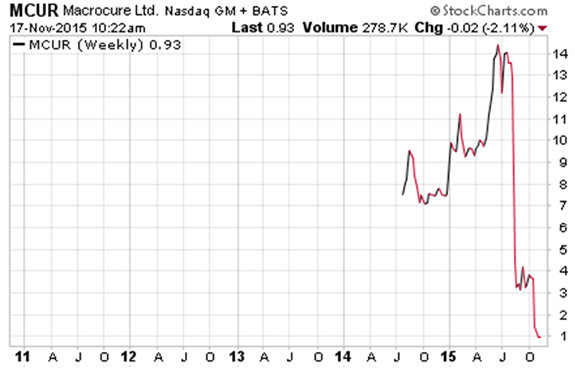How To Find Good Penny Stocks To Buy Right Now
 What’s the best way to find penny stocks to buy right now?
What’s the best way to find penny stocks to buy right now?
First, focus on the fundamentals. Discipline yourself to ignore all the intoxicating tales of profits just around the corner spun by pump and dump promoters.
What kind of fundamentals?
Start with the ability of the company to make money. If you don’t think that can happen, why bother?
And why not deal with the here and now? Let’s look at what’s going on with the company today.
If management is talking about profits in the future, when does the future arrive? And what has to happen for profits to hit the books? What has to be sold?
Has the product been produced? If not, how come? Does it need any kind of regulatory approval?
Look at the income statement. See if the company is actually selling something and bringing in revenue.
Dig a little deeper on this and see how the revenue is being reported. Here’s what I mean.
Let’s say your penny stock company sells a widget for $24,000.
And it reports all of this $24,000 as income for the current quarter. But whoever bought the widget has negotiated payment terms of half up front and the remaining $12,000 spread out over the next two quarters.
This can make a difference. It hits cash flow.
Here’s something else to look at.
Good Penny Stocks Have Reliable Revenue
See where the revenue is actually coming from. If your company reports $1.5 million in revenue for the most recent quarter, and $1.2 million came from selling off some excess inventory to a wholesaler, that’s not good.
Or maybe the income the company reports is from a one-time legal settlement.
The company’s CEO comes out and crows about “Income is up 134% this quarter.”
But there’s no mention of the one-time legal settlement. This detailed information will usually be buried in a document like an 8-K. This is a document the company files with the Securities and Exchange Commission, the SEC.
These docs aren’t very exciting, but they can sure be illuminating. The disclosures, exhibits, and financial statements are where you’ll find piles of dirty laundry.
But you’ll also find the good news. And because so many penny stocks are completely ignored by analysts and fly under the radar, this is where you can find out about opportunities before most other investors have a clue.
So when you find solid revenue, real money coming in, you just might have one of the good penny stocks to buy right now.
But don’t limit your sleuthing to the income statement. Take a look at the balance sheet.
Good Penny Stocks Have Clean Balance Sheets
Start off by looking at assets. Actual assets, not goodwill.
You’d be amazed at how many of the pump and dump penny stocks don’t have any assets showing up on the balance sheet.
Actually, you’d be surprised at how many pump and dump stocks don’t even have a balance sheet. If they aren’t traded on an exchange, they don’t have to file one with the SEC.
See if the value of the firm’s assets is growing, shrinking, or staying the same. Look at how much the company owes. Is it long-term or short debt?
Based on how much money it spends, does it have enough money in the bank to stay in business?
Has it been refinancing existing loans? This is never a good sign. If the company is struggling to stay afloat, and borrowing more money at higher rates, why should you invest in it?
You always want to make sure you’re buying penny stocks in resilient companies… not companies that spew out endless promises.
To protect yourself, commit to mastering the blocking and tackling skills.
Some simple fundamentals of due diligence can keep you safe.
Want to see how this process plays out? Let’s take a look at a penny stock so you can do this for yourself.
Good Penny Stocks Have Multiple Income Streams
Multiple income streams means money comes in through more than one door.
The company doesn’t bet the farm on one product.
Here’s one that did, and look at what’s been happening.
Macrocure Ltd. $MCUR trades on the NASDAQ.
It’s a biotech stock, and in the spirit of full disclosure, I’ve got to tell you that the biotechs aren’t very appealing to me.
I’m the first to admit I don’t understand the biotech business. The science takes a better mind than mine to grasp.
Being able to carve out the winners from the losers is a challenge even for an expert who lives in the biotech world.
Some penny stock traders say that biotech stocks are like lottery tickets. I can’t disagree.
One other strike against Macrocure – it’s not an American company. It’s based in Israel.
You usually get better financial data and stronger disclosure when you invest in a U.S.-based firm.
So when we look at Macrocure, let’s just look at it as a business so we can learn from the numbers.
The day I checked it out, Macrocure had a market cap of $22.06 million and the stock traded at $1.32.
Here’s how the stock has been doing…

Ugly, isn’t it?
So right off the bat, before I slog through the income statement and the balance sheet, I’ll let my curiosity get the best of me and try to find out what happened to send the stock into a tailspin in August.
August 19th the stock opened at $12.60. The next day, it closed at $2.98.
Sometimes all you can say is, “Wow.”
Eight days later, the following headline showed up on Reuters.
“Macrocure’s lead drug fails late-stage study.”
Why did the stock swoon eight days before this information became public?
Who knew what and when did they know it? You’ve got to wonder.
Do you see all the warning signs?
Can you find a single good reason to invest in this beat-up biotech penny stock?
The Bloodied Penny Stock Balance Sheet
When you look at a balance sheet, which you can find on any of the finance sites, go to the line that reports Retained Earnings.
Retained earnings mean what’s left over from money that’s been made after dividends have been paid. It’s the money the company invests back into the business or to pay down debt.
At Macrocure, there aren’t any retained earnings. Only losses. And the losses are steamrolling. Money is flying out the door.
In 2014, losses hit $68.2 million. In 2013, they were $47.7 million, and in 2012, $24.4 million.
Not exactly an encouraging trend.
Have you seen enough?
Do you see how spending just a few seconds glancing at a balance sheet can arm you with essential information?
If you want to find the best penny stocks to buy right now, find a balance sheet that’s in decent shape.
Take a look at how much money is in the bank. Is there enough cash on hand for the company to stay afloat while it waits for revenues to come in?
Is there a long-term pile of cash tucked away? Are there any real assets?
You can always depend on the balance sheet to shed important light on the company. Unless executives are playing fast and loose with the facts, you’ll know where things stand.
How do things stand with your penny stocks?
Are you turning up some interesting opportunities?
It would be great to hear from you. And if you have a question about a stock or investment idea, shoot us an email. You can also leave us a comment on the website.
Good investing…
Brian Kent
Note: If you’re interested in learning more about Brian Kent’s Penny Stock All-Stars premium service… and learning about the stocks we’re trading for profit… you can get the inside scoop on penny stocks here.
Category: Investing in Penny Stocks




